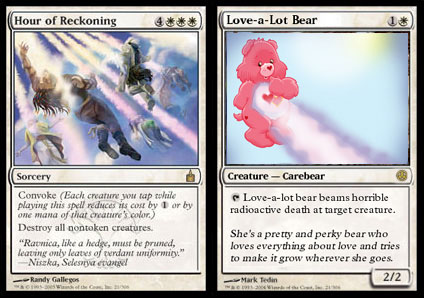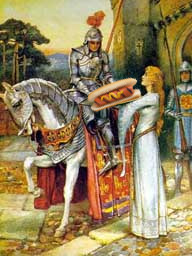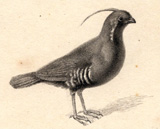
We can learn a lot from Sir Lancelot du Lac. The noblest knight of King Arthur's court, he travelled the lands of Christendom in search of the holy grail. The grail was the legendary cup from which Christ himself drank at the last supper he took with his disciples. It was an age when knights were bold, dragons were fearsome and small, furry creatures from Alpha Centauri crept into the narrative due to poor research on the part of the author.
Our story today doesn't start with noble knights, though. It starts with an embarassing tale of failure. And some swearing.
Ravnica, City of Guilds, was a dream held in the minds of Magic players throughout the world. With the coming of Ravnica a new age of Magic would dawn. Strong color fixing would banish the narrow dullness of mono-colored decks. Creativity would blossom throughout the Magic world. Games would be interesting and interactive. Limited formats would be rich and deep.
"Butter! Duck! Duck! You lucky bun of a witch!" I muttered at my monitor, or something quite similar. There was a time when I would have shouted at my monitor, but the last ever MD5 draft I did made me realise that it was important to reserve shouting only for very special occasions (my opponent was on two life and topdecked his Loxodon Warhammer into an empty hand for the third game in a row to win the match).
My source of grief on this occasion was nothing particularly new and exciting. Magic Online's release leagues - about which I have spoken before - continued to torment me. Previously I have tended to complain loudly about my near-supernatural ability to go 4-1 when a 5-0 record is required. This year the gods of Magic listened to my complaints and the curse of 4-1 was lifted. I went 2-3 with one of the best Sealed decks I've ever opened. My losses were varied and not terribly interesting. The first was to Glare of Subdual. The second was to horrible mana problems (from which I recovered eventually, but my opponent's tempo was unstoppable). The third was due to me deciding to try out an alternative build which was massively inferior to my original one.
None of that really matters. Our story begins after the dying embers of my attempt at 5-0 had long since ceased to glow.
Exciting new cards meant new decks in the casual room. That was the real heart of Magic, after all, right? I played a few games and won them. Then I played against a guy tuning his new deck for Standard. That was short, messy and not much fun. I realised I wasn't in the mood for Casual.
So what about Constructed? After all, nobody ever really had any reason to think Ravnica Sealed would be anything special. Ravnica was going to save Constructed, right? Maybe I should take up Constructed?
My cat wandered into the room. I quickly tried to close my Magic Online window before the cat saw my score, but I was too slow.
"Two-three," it mused out loud, "if I recall correctly that's actually your worst Sealed result ever. That must have been a truly awful cardpool."
"Yeah, awful." I responded evasively.
"Which is odd, because you seemed to have Overrun, Hour of Reckoning, Selesnya Guildmage, Selesnya Evangel, Faith's Fe..."

The art for Hour of Reckoning was the first clue that Carebears were
coming to Magic in Guildpact
"Please don't get angry," it replied reasonably, "you're just in denial about your awfulness. If you accept that you lose because you're awful you'll find it easier to relax."
"It's true, I'm awful," I lamented, "Do you think I should take up Constructed?"
"No."
"Oh, let me guess, I'd only be awful?"
"You probably would," the cat nodded, "but that's not the reason. The reason is that you're playing for the wrong reasons. You're looking for the holy grail."
According to legend, Joseph of Arimathea used the grail to catch drops of Christ's blood. He later brought the holy grail to the British Isles. This cup wasn't just interesting for its historical significance, though. It also had supernatural properties. It is written that the grail's bearer would never step in dog poo whilst his or her attention was elsewhere, could make perfect paper aeroplanes and would always have Umezawa's Jitte in their opening hand (which is why Galahad did so well at Masques Block Constructed).
But what was really impressive about the grail is how many knights spent ages and ages looking for it. Pretty much all of them, in fact.
Lancelot wasn't just any old knight, though. He was raised from childhood by the Lady of the Lake, who was herself one of the fay. To the modern ear that might make her sound like some kind of transsexual, but in fact the fay were rough, tough spirits you really didn't want to mess with. So really the whole grail quest thing wasn't much of a fair fight to start with. Sure, Arthur had that whole being king thing going on. Plus he had a great beard. But really the rest of the knights weren't even close. If anyone was going to find the grail it was going to be Lancelot.
Well, he did succeed in catching a fleeting glimpse of it. Such was the power of the grail that this brief sighting cast him into unconsciousness. It took him some time to recover.
My own grail quest began in 1995 with the release of Ice Age. I had played Magic before then, but dismissed it as a crude commercial ploy to wring money out of gullible gamers. A friend of mine organised a small, private tournament. The format was Ice Age Sealed. The tournament was a lot of fun. We ran it as a round robin, so an awful lot of Coke was drunk, greasy snackfood consumed and Magic played before we had a result. I came second in the tournament on the strength of two copies of Goblin Snowman and a Stormbind. After the tournament, unfortunately, nobody was talking about the games. All the debate was about how broken Shield of the Ages was (which had featured in the winning deck).
And there began the quest. We all liked Magic. All we wanted to do was play it. But we wanted to play a fair, balanced game of it. We didn't want anyone to have Shield of the Ages or Stormbind or Goblin Snowman or any other broken card.
Having glimpsed the grail, it took me some time to recover.
Fast forward to Spring 2003. I'd been hearing about Magic from time to time but largely ignoring it. Now, however, reports were reaching me of Magic Online. Considering I spent my life online anyway this seemed like a good deal. Magic turned out to have improved a lot in my absence and the non-shared timers really made tournament play a lot more fun. I became quite fond of online leagues for a while...
...it was just a shame that Magic was so horribly flawed.
The broken cards were still there. My opponents killed me with Rorix and Silvos and Visara whilst I desperately struggled to see how my humble Clerics or Goblins or Zombies could have done anything to avert this fate.
And yet some of the games were really fun. It was clear the grail was there. Magic, as a game, had the potential to be something great. And presumably it was, if only I could find the right format.
I heard about drafting. Apparently, this was the Limited format of choice amongst players who knew what they were doing. Drafting, more than anything else, teaches you to hate mana problems. You very frequently lose games because statistics dictates that sometimes your mana floods or fails to appear at all. This is mostly independent of your deck. This is also mostly independent of your opponent's rating (although one 1411-rated opponent once managed not to kill me when I drew land for my first seven consecutive turns in a CBS draft).
If only every game could be like the good games. Indeed, I began to wonder if drafts were fun because drafting was a good game and the actual Magic games were just tense 30-minute intervals during which you desperately hoped you'd get to play Magic instead of just watching your opponent goldfishing.

Lancelot offers Elaine a taste of
his huge wiener
As a result, Lancelot ended up in a war with King Arthur. Very messy.
But it gets worse. It was eventually Lancelot's son who found the grail. His son, Sir Galahad, was the result of a somewhat illegitimate liaison with the daughter of the Fisher King. He, for those who don't know, was basically the keeper of the grail. Lancelot was nothing but trouble with the ladies.
But the real question is: how was Galahad able to succeed where Lancelot had failed?
"Magic is a good game," my cat explained, "but it isn't a perfect game. If you're trying out all these new formats to try to remove all imperfections from Magic, you're doomed to failure. You only want to play Constructed because it's becoming increasingly clear that your Limited rating will never reach 1800 and when you eventually manage a 5-0 record it will be mostly by chance. You're kidding yourself that every bad experience you ever have with the game is because of something intrinsic to the game. But ask yourself this: why did you stop playing chess?"
"Well - Chess just gets boring. Same old positions, same old moves, hours and hours of trying to look ahead and anticipate possibilities."
"But in fact there was plenty of depth left in the game. And no manascrew either. You were just tired of making the effort. And what about Bridge?"
"I still play."
"Not competitively."
"Well, it's too much about memorising conventions. You need to understand the exact nuances of every bid your opponents make. It takes a lot of work to keep on top of it all."
"But in fact these games avoid everything you most hate about Magic. Before you try to escape Magic's flaws, you have to ask yourself why you play it at all!"
Galahad found the grail. Galahad succeeded because the grail's power was about a lot more than drawing Umezawa's Jitte. The grail could only be claimed by a knight who was worthy and pure. Lancelot spent far too much time waving his wiener around to qualify on that score. And in fact modern interpretations of the grail myth takes things a stage further. It is not the grail that matters, it is the quest itself. It's exactly the opposite of doing your grocery shopping. That's all about coming back with the groceries. The actual trip to the shop and back you'd do without if you could. But with the grail quest it is the process of becoming worthy to claim the grail which is the true reward.
Indeed, Sir Percival actually found the grail as a young man, but had to turn away from it and return years later because he was not yet ready. But he did return. He was one of the two who stood at Galahad's side.
"You've got the whole Sir Percival thing going on," explained the cat, who had timed things perfectly to synch up with my narration, "you actually found the grail back when Ice Age came out, but you weren't ready."
"So," I challenged her, "what do I need to do to find the grail? To truly play Magic?"
"Never mind you. Take a look at Antoine Ruel. He just won Pro Tour LA. Given the diverse field of decks and the nature of the format that's got to be one of the most satisfying wins in Magic history. But he himself said that he had begun to enjoy the game more before his win. Not just the game itself, but the people and places of the Pro Tour."
"So he cared less about winning and then he won?"
"He didn't care less. He was absolutely delighted when he won. What he had come to understand is that the grail itself, sublime though it was, nonetheless was of secondary importance to the quest."
"So you're saying I should just chill out and enjoy the game? If I knew how to do that, don't you think I'd be doing it anyway?"

The onion rings carton from
Christ's last mid-afternoon
snack, which never quite
made it as a holy artifact
"One part of the grail legend that is very seldom told is known to me. After Galahad finally found the grail he spent many days praying and contemplating it. At length he received a revelation of sorts. The grail was indeed the cup of Christ, but despite all the historical and religious importance it had taken on and despite the quest and the many knights who had sought it... the grail was still just a simple cup. Galahad came to understand that it was not the quest for the grail that mattered, it was the quest for something. The grail had, for the knights of the round table, become a symbol of that ideal."
It gradually became clear to me that the cat's dramatic pose silhouetted against the setting sun was nothing more than a devious excuse to chew the potted plant on the windowledge without me noticing. I grabbed her and dumped her on the carpet.
"So in the world of Magic, tournament victories are just..."
"No, no, no," the cat interrupted, "It is Magic itself you have misunderstood. Richard Garfield is a skilled game designer, but he did not design Magic to be the grail. He designed it to be nothing more than a passtime to fill the idle minutes between gaming sessions. It was only when a hundred knights set out on their quest that Magic became the grail. The game's faults only exist in this context. As Richard designed it, the game achieves what it set out to achieve. When Christ drank from the holy grail, to him it was just a cup."
This has always been Magic's great burden. No matter how much the elite of Wizards of the Coast may orate to persuade us otherwise, Magic is at its heart not well suited to its position as king of trading card games. It is still the genre's brightest star, but that's a matter of economics as much as game design. To be successful a trading card game needs as many players as possible. Players need to be able to find opponents. Card printing costs (which tend to be high) need to be made back in sales. But in order to succeed, a TCG needs players to have confidence that it will succeed. It's a chicken-and-egg situation that means huge marketing budgets and high risks.

Nope, that's a quail,
try again
More importantly still, whilst many players leave Magic all the time many do return. Are they still looking for the grail? Or is it that having stepped aside from their quest they came to a clearer understanding of what it was about the game they valued?
You know what happened to Lancelot? He went mad and retired to a hermitage.
We can learn a lot from Sir Lancelot du Lac. Our story today doesn't end with noble knights, though. It ends with an embarassing tale of success. And some swearing. But this time it's my opponent swearing as I Scatter the Seeds at the end of his turn, thanks to Doubling Season I get six saprolings and thanks to Breath of Fury his 18 point life lead and impressive but tapped Boros army is suddenly rather irrelevant.
My quest for the grail isn't over yet. In the meantime, I'm happy enough playing Magic.
Credits
Editing: Goblinboy & Binary
Comments